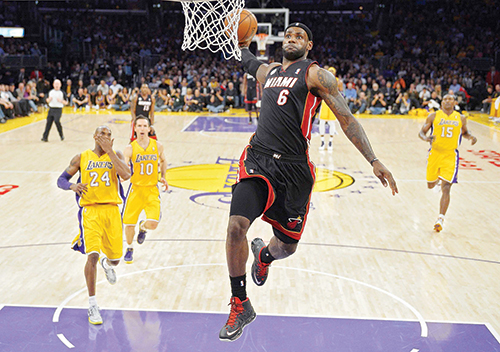
By this time next week, the 2012–13 NBA season will have officially come to an end. After a lockout-reduced schedule last year, the association doled out a full 82-game helping to 30 different fan bases over the past six months, complete with all the requisite stare-downs, petty feuds, confounding press conferences and damn-near-physically-impossible aerial highlights. This latest campaign comes to an end in Portland much as it did last year, with the Blazers exceeding expectations over the first half of the season before methodically confirming them in the weeks following the All-Star break.
There were eight postseason spots up for grabs in the West, and Portland made an admirable run down the stretch to try to sneak in and snatch one before anyone noticed. But their inexperience and lack of depth on the roster, along with a handful of injuries to key players during the final playoff push, ultimately locked down another lottery pick for the franchise this summer.
The Blazers were good enough to be in the conversation for an eighth seed up until about a month ago, and scrappy enough to delude the faithful into thinking that they might make it in as recently as late March. Just like last season, though, their efforts landed the operation right back in no-man’s-land. They had just the right amount of talent to get close to the playoffs and fall short, without falling apart so thoroughly as to give them a reasonable shot at a top-five draft pick in June.
So it goes in the City of Roses, and if there’s any consolation for the NBA diehard, it’s that the show is just getting started. The playoffs get underway a week from Saturday, and there are 16 teams left standing and more than 200 hours of action to fill your time and destroy your relationships with the people you love most. As always, it’s not just about the matchups in the NBA (sometimes not at all), but rather the story lines that develop over four rounds of best-of-seven bedlam.
In theory, of course, everyone has a shot. In reality, though, there are only a handful of teams in contention for the Larry O’Brien Trophy this year, many of them coming out of the West and almost none having much of a chance once they run into the Miami Heat in the finals.
You’ll notice I said once, not if. Because if you’ve followed professional basketball at all this year, you’re no doubt aware that the league’s default MVP, LeBron Raymone James, is currently putting the finishing touches on one of the most statistically efficient and exhaustingly dominant seasons ever turned in by a player in the 65 years since the league went into business.
After taking the Heat to the NBA Finals in his first season with the team two years ago, and getting upended by a Dallas Mavericks squad that was hopelessly overmatched but obviously not bright enough to realize it, LeBron spent the offseason in the gym, working on his post-game and shoring up the last remaining weaknesses in his Oscar-Robertson-meets-Spiderman skill set.
The Heat came back in 2011–12 to roll through the playoffs and stomp down Kevin Durant and the Oklahoma City Thunder in five games, with LeBron earning the regular-season and finals MVP awards for his trouble. He added a gold medal to that tally in August at the London Olympics, then did what any reasonable athlete would do after putting in the kind of year that rendered everyone else in the discussion all but irrelevant. He went back to work.
This year, LeBron is doing exactly what all those “Witness” Nike ads gambled on back in 2005—basically, anything he wants. His stat line reads like a video game on easy mode: 27 points per game, with eight rebounds and seven assists on 56 freaking percent shooting. He’s his team’s most frightening and versatile scoring option, its best passer by far, and the only player in the league who can not only defend every position on the court but defend them well. Add to that a newfound restraint on the perimeter and an increased awareness of court positioning (oh yeah, he’s shooting 40 percent from beyond the 3-point line), plus a notable upgrade in his supporting cast over the offseason and, frankly, there’s just nowhere to run anymore. LeBron is everywhere.
Naturally, it’s easy to fall into hyperbole when discussing a once-in-a-generation athlete like Lebron. And, to be sure, there are others who have earned your attention going into the postseason. The Thunder are as electrifying as ever, the Spurs are still finding ways to take down teams half their age and Denver, Memphis and the LA Clippers are getting more consistent—and more dangerous—with every tough loss they take to a more disciplined lineup. The Knicks have somehow managed to mold their dysfunctional extended family into a surprising No. 2 seed in the East, while the Indiana Pacers come in as the most underrated (and under-the-radar) 50-win team in recent memory.
It’s just that they’ve all been relegated to counterpoints in the argument that LeBron has been making since the league opened its doors again on Halloween last year, and whether you’re a fan or not it’s an unavoidably convincing one. It isn’t difficult to recognize that there are plenty of reasonable betting options heading into the 2013 playoffs. But there’s only one story, and he plays point-shooting-forward down in South Beach. Everything else is secondary.
